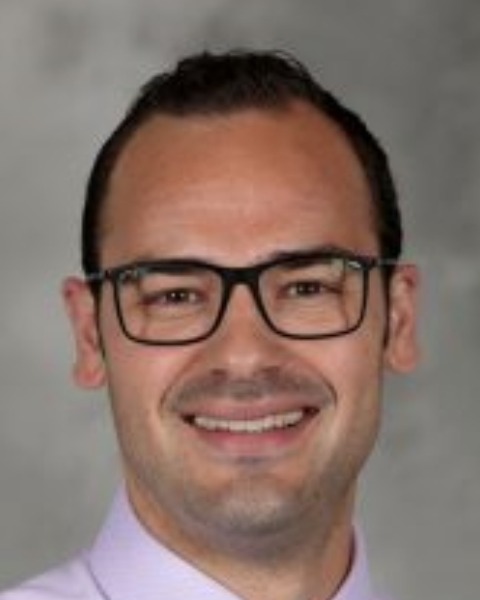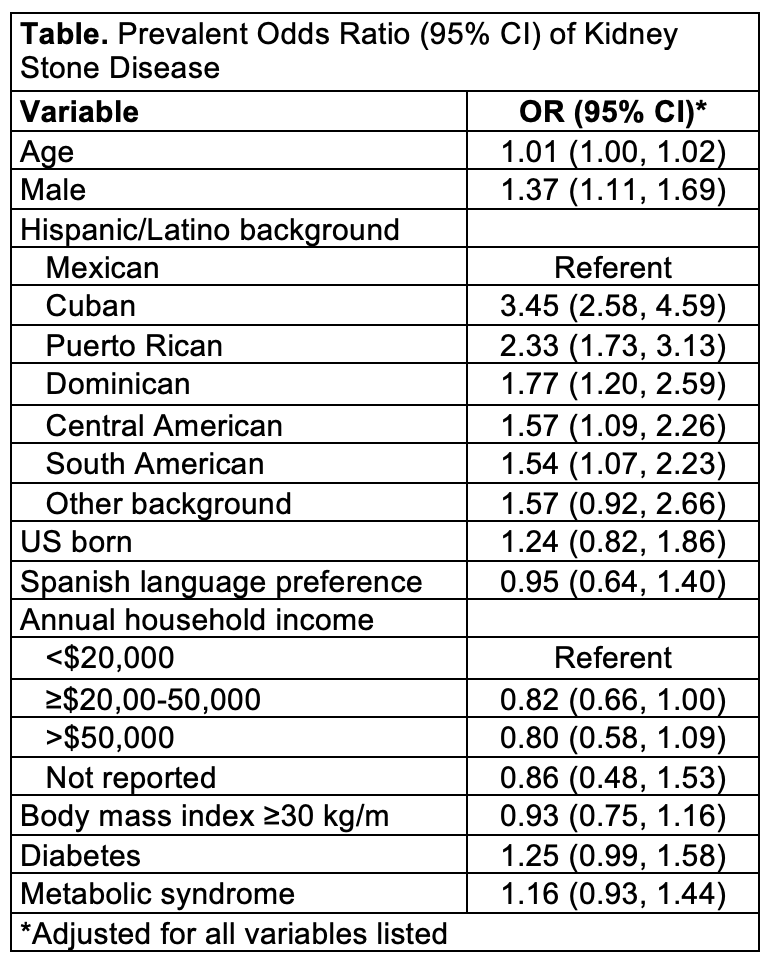Back
Poster, Podium & Video Sessions
Moderated Poster
MP26: Stone Disease: Epidemiology & Evaluation I
MP26-06: Prevalence of Kidney Stone Disease in U.S. Hispanic/Latino Adults: Findings from the Hispanic Community Health Study / Study of Latinos (HCHS/SOL)
Saturday, May 14, 2022
10:30 AM – 11:45 AM
Location: Room 225
Marcelino Rivera*, INDIANAPOLIS, IN, Jinsong Chen, Ana Ricardo, Chicago, IL, Robert Burk, Bronx, NY, Jianwen Cai, Chapel Hill, NC, Martha Daviglus, James Lash, Chicago, IL

Marcelino E. Rivera, MD
Assistant Professor of Urology
Indiana University
Poster Presenter(s)
Introduction: There is limited data available regarding the prevalence of kidney stone disease history in U.S. Hispanics/Latinos. The objective of this study is to investigate the prevalence of and risk factors for kidney stones among a diverse population of U.S. Hispanic/Latino adults.
Methods: The Hispanic Community Health Study/Study of Latinos (HCHS/SOL) is a community-based cohort of self-identified Hispanic/Latino adults from diverse backgrounds in the U.S. aged 18-74 years at enrollment through a multi-stage probability sampling design. We used data from 10,965 participants who completed a survey on self-reported history of kidney stone disease which was collected at a second study visit (2014-2017). Prevalence estimation accounted for the complex sampling design. Multivariable logistic regression was used to evaluate the association of risk factors with stone disease.
Results: The prevalence of kidney stone disease history was 10.6% (95% CI, 9.1%, 12.2%) in men and 7.8% (6.9%, 8.7%) in women. The prevalence varied by Hispanic/Latino background, and was lowest in persons of Mexican background (5.0%, [4.2%, 5.9%]) and highest in persons of Cuban background (16.2 [13.4%, 19.0%]. On multivariable logistic regression analysis, risk factors for prevalent kidney stone disease included older age and male sex (Table).
Conclusions: Kidney stone disease prevalence varied considerably by Hispanic/Latino background. Further investigation is required to determine reasons for these findings, as well as intrinsic and extrinsic causes of stone disease among Hispanic/Latino adults.
Source of Funding: The Hispanic Community Health Study / Study of Latinos is sponsored by the National Heart, Lung, and Blood Institute (NHLBI) and six other centers and Institutes of the National Institutes of Health (NIH).

Methods: The Hispanic Community Health Study/Study of Latinos (HCHS/SOL) is a community-based cohort of self-identified Hispanic/Latino adults from diverse backgrounds in the U.S. aged 18-74 years at enrollment through a multi-stage probability sampling design. We used data from 10,965 participants who completed a survey on self-reported history of kidney stone disease which was collected at a second study visit (2014-2017). Prevalence estimation accounted for the complex sampling design. Multivariable logistic regression was used to evaluate the association of risk factors with stone disease.
Results: The prevalence of kidney stone disease history was 10.6% (95% CI, 9.1%, 12.2%) in men and 7.8% (6.9%, 8.7%) in women. The prevalence varied by Hispanic/Latino background, and was lowest in persons of Mexican background (5.0%, [4.2%, 5.9%]) and highest in persons of Cuban background (16.2 [13.4%, 19.0%]. On multivariable logistic regression analysis, risk factors for prevalent kidney stone disease included older age and male sex (Table).
Conclusions: Kidney stone disease prevalence varied considerably by Hispanic/Latino background. Further investigation is required to determine reasons for these findings, as well as intrinsic and extrinsic causes of stone disease among Hispanic/Latino adults.
Source of Funding: The Hispanic Community Health Study / Study of Latinos is sponsored by the National Heart, Lung, and Blood Institute (NHLBI) and six other centers and Institutes of the National Institutes of Health (NIH).


.jpg)
.jpg)